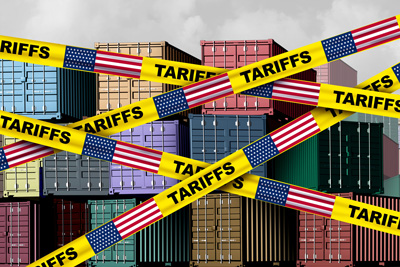Finding Your Path
The Tariff Roller Coaster Ride. Hang On and Buckle Up Tight.
By Lorne Polger, Senior Managing Director

Feeling a bit unbalanced these days with the tariff roller coaster ride? How could you not? Volatility will be the norm for a while. Real estate owners and investors love predictability; that’s about the last thing that we find ourselves in with the current environment, as massive swings in indexes, costs and interest rates leave me feeling like I just got off a ride at the annual San Diego County Fair (thank goodness I gave up the Fair’s famous fried coffee years ago).
After the last couple of weeks, we are beginning to understand the role that tariffs can play in the equity markets. But what about their direct and indirect impacts on commercial real estate (CRE)? While we are only beginning to understand the impact, we do know that different sectors within CRE will be affected differently, depending, in part, on the scope and scale of the tariffs. Here is a breakdown of some of the ways that tariffs may influence CRE in the months and years ahead.
1. Construction Costs.
Higher prices on imported materials (like steel, aluminum, and lumber) brought about by tariffs can significantly raise the costs of construction. In turn, this could delay or cancel new CRE developments (which have already been drastically reduced as higher costs and interest rates have reduced developer margins) and potentially increase rents or selling prices to offset those higher development costs.
 Tariffs on imported materials like steel, aluminum, and lumber can send construction costs soaring. Developers may face higher upfront costs on new builds or renovations, forcing many projects to slow down or go back to the drawing board.
Tariffs on imported materials like steel, aluminum, and lumber can send construction costs soaring. Developers may face higher upfront costs on new builds or renovations, forcing many projects to slow down or go back to the drawing board.
This creates a ripple effect which can lead to:
- Fewer new developments – which can lead to...
- Tightened supply – which can result in...
- Potential upward pressure on rents, especially in high-demand markets.
But it’s not just about rising costs, it’s also about uncertainty. With fluctuating tariffs, budgeting becomes harder, timelines less dependable, and margins thinner.
2. Multifamily.
Apart from new developments, we believe that the multifamily sector remains largely insulated from the impact of tariffs. Absent tariffs creating a dramatic rise in unemployment rates, population trends and demographics support the continued strength of the multifamily sector. There remains a significant undersupply of housing across many markets in the country. In the past year or two, we have started to see a massive drop in new deliveries. If tariffs exacerbate that situation, we should expect that strong demand and reasonable absorption of new supply will push up rents in both the short- and mid-term.
3. Industrial and Logistics Properties.
Tariffs can disrupt global supply chains, affecting both import/export businesses and manufacturing businesses. Companies may need to rethink warehouse locations or logistics hubs, shrink or expand space depending on changes in demand. We may see a shift toward onshoring or nearshoring (think Mexico), which could boost demand for North American industrial real estate.
Industrial real estate often rides the wave of global trade. When tariffs disrupt supply chains, manufacturers and distributors may:
- Reconfigure warehouse footprints.
- Shift to domestic suppliers.
- Invest in onshoring to reduce dependence on imports.
This can be a boon for industrial space in the U.S., especially near ports, transportation corridors, or urban centers. But if trade volumes drop significantly, some logistics facilities could become underutilized or even obsolete.
4. Retail Sector Impacts.
Tariffs on consumer goods can lead to higher retail prices, reducing consumer demand. We would expect to see pressure on retailers’ margins, especially if they cannot pass on costs to consumers. As a result, this could continue the years-long trend of store closures or downsizing, hurting retail CRE occupancy and lease rates. It would not be a surprise to see retailers shrink their store footprints, delay new openings, or renegotiate leases.
In a market already transformed by e-commerce and shifting consumer behavior, tariffs add yet another layer of stress to brick-and-mortar retail.
5. Office and Mixed-Use: Cautious Optimism.
While office and mixed-use properties may be less directly impacted, companies exposed to global trade (especially in logistics, manufacturing, or import/export services) may rethink expansion plans if they see changes in demand. Combined with broader economic uncertainty, this could lead to slower leasing activity or longer decision cycles. Mixed-use developments that emphasize flexibility and diversified tenant bases may weather the storm better than traditional urban office towers.
6. Investor Confidence and Market Uncertainty.
 As noted above, trade tensions and tariffs introduce economic uncertainty. When investors are more risk-averse, transaction volumes fall. Lenders might tighten conditions, making the financing of CRE deals harder. Property values could stagnate or fall in sectors seen as high risk in this environment.
As noted above, trade tensions and tariffs introduce economic uncertainty. When investors are more risk-averse, transaction volumes fall. Lenders might tighten conditions, making the financing of CRE deals harder. Property values could stagnate or fall in sectors seen as high risk in this environment.
Final Thoughts.
The real takeaway? Tariffs add friction – to costs, timelines, and strategic planning. But they also create opportunities for agile investors who can spot shifting trends early.
Those thinking with the windshield in front of them will reassess construction budgets with tariff risk in mind and stay close to logistics and supply chain trends – these will shape demand for years to come.
In a global economy, few things operate in a vacuum. Tariffs may seem far removed from the day-to-day operations of commercial real estate – but their ripple effects can reshape markets, from construction sites to shopping centers. At Pathfinder, we are staying informed and nimble, while keeping our eyes on the big picture.
Lorne Polger is Senior Managing Director of Pathfinder Partners. Prior to co-founding Pathfinder in 2006, Lorne was a partner with a leading San Diego law firm, where he headed the Real Estate, Land Use and Environmental Law group. He can be reached at lpolger@pathfinderfunds.com.
Share this Article
IN THIS ISSUE
PATHFINDER MULTIFAMILY OPPORTUNITY FUND IX, L.P.
CHARTING THE COURSE
On Uncertainty, Geopolitics and Own Goals
FINDING YOUR PATH
The Tariff Roller Coaster Ride. Hang On and Buckle Up Tight.
GUEST FEATURE
From Bricks to Clicks: What We Can Learn from the History of Apartment Tech
ZEITGEIST
News Highlights
TRAILBLAZING
Cedardale Apartments, Federal Way (Seattle), WA
NOTABLES AND QUOTABLES
Perseverance
